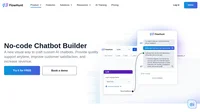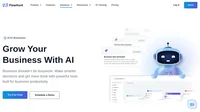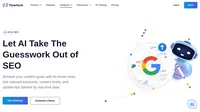Personalized Marketing with AI refers to the use of artificial intelligence technologies to tailor marketing strategies and communications to individual customers based on their behaviors, preferences, and interactions. This approach leverages data analysis and machine learning algorithms to deliver unique marketing experiences to each customer, aiming to improve engagement, satisfaction, and conversion rates.
In-depth Explanation
AI personalization uses a customer’s demographic and past behavioral data — such as browsing and purchasing history, as well as social media interactions — to learn about the specific needs and preferences of that individual. According to Bloomreach, this insight allows technology to predict interests and make real-time product recommendations. For example, an ecommerce website might feature a “Customers also bought” section to encourage additional purchases. This method is crucial for brands as it allows customizing interactions at scale, enhancing customer engagement, conversion rates, and revenue.
Key Concepts
Personalized Experiences
Personalized experiences involve creating unique interactions for each customer based on their preferences and behaviors. AI facilitates this by analyzing data collected from various customer touchpoints to tailor content, offers, and recommendations that resonate with the individual. According to Forbes, AI-driven personalization is about using technology to understand and cater to the nuances of individual consumer preferences, moving beyond generic marketing.
Artificial Intelligence Personalization Marketing
This concept involves employing AI technologies to customize marketing efforts at scale. AI personalization in marketing allows businesses to automatically generate and adjust marketing messages, product recommendations, and customer interactions in real-time, based on detailed data analytics. Marketing AI Institute highlights that AI enables the personalization of marketing messages at scale, using real-time information to optimize campaigns and predict future behaviors.
Product Recommendations
AI-driven product recommendations use algorithms to analyze customer data such as past purchases, browsing history, and preferences to suggest products that a customer is likely to be interested in. This is crucial for personalized marketing because it helps increase sales and customer satisfaction by providing relevant suggestions. According to McKinsey, two-thirds of customers value relevant product recommendations as a decisive factor in their purchase decisions.
Marketing Personalization
Marketing personalization encompasses strategies that tailor marketing messages and content to individual customers. It involves using customer data to create targeted marketing strategies that cater to the specific needs and preferences of each customer. The Marketing AI Institute emphasizes the importance of personalization in enhancing customer satisfaction and long-term loyalty.
Machine Learning
Machine learning is a subset of AI that involves training algorithms to recognize patterns and make predictions based on large data sets. In personalized marketing, machine learning algorithms analyze customer data to improve the accuracy of targeted marketing efforts, such as advertisements and recommendations. These technologies enable marketers to personalize messaging and predict future customer behaviors efficiently.
Email Marketing
AI enhances email marketing by personalizing email content based on customer data. This includes optimizing send times, crafting personalized subject lines, and tailoring email content to individual preferences, thereby increasing open rates and engagement. Personalized email marketing can significantly boost customer engagement and conversion rates by aligning with individual customer needs and preferences.
Customer Preferences
Understanding customer preferences is vital in personalized marketing. AI collects and analyzes data about customer behaviors, likes, and dislikes, which businesses use to tailor marketing strategies that align with individual interests. This detailed understanding allows businesses to deliver more relevant and engaging customer experiences.
Personalized Marketing Campaigns
These campaigns use AI to deliver targeted marketing messages and offers to customers based on their unique profiles. By employing data-driven insights, businesses can create campaigns that resonate more with their audience, thereby improving conversion rates and ROI. Personalized campaigns often lead to better customer satisfaction and loyalty.
Analyzing Customer Data
AI analyzes vast amounts of customer data to extract insights about customer behaviors and preferences. This analysis allows marketers to create more personalized and effective marketing strategies. The ability to quickly process and interpret large data sets is a significant advantage of AI in marketing personalization.
Customer Satisfaction and Engagement
AI-driven personalized marketing enhances customer satisfaction and engagement by delivering relevant and timely content that meets individual customer needs, leading to improved brand loyalty and customer retention. Organizations using AI personalization report significant improvements in marketing ROI and customer retention rates.
Powered Personalization
This refers to the use of AI technology to automate and enhance the personalization process, making it more efficient and scalable. AI-powered personalization involves using data-driven insights to tailor marketing efforts in real-time. It enables businesses to respond quickly to changing customer preferences and market dynamics.
Examples and Use Cases
Dynamic Websites
AI can create dynamic websites that adapt content based on user behavior and preferences. For instance, an e-commerce site might display different products to different users based on their past browsing history and purchase behavior.
Tailored Recommendations
Retailers like Amazon and streaming services like Netflix use AI to provide personalized product and content recommendations based on user interactions and preferences. These personalized recommendations enhance user experience and satisfaction.
Predictive Analytics
AI uses predictive analytics to forecast customer behaviors and preferences. This helps marketers to anticipate customer needs and tailor their marketing strategies accordingly, improving campaign effectiveness.
Sentiment Analysis
AI-driven sentiment analysis tools analyze customer feedback, social media posts, and reviews to gauge overall sentiment towards a brand or product. This data helps marketers adjust their strategies to better meet customer expectations.
Assistive Search
AI enhances search functionalities by providing personalized search results based on user history and preferences. This makes it easier for customers to find relevant information and products quickly.
Chatbots and Virtual Assistants
AI-powered chatbots and virtual assistants offer personalized customer support by understanding and responding to customer queries in a human-like manner. They can also provide personalized product recommendations and assistance, improving the overall customer experience.
Ethical Considerations and Challenges
Data Privacy
Ensuring the privacy and security of customer data is a significant concern in AI-driven personalized marketing. Businesses must comply with data protection regulations and be transparent about how customer data is collected and used.
Bias and Discrimination
AI algorithms must be carefully designed and tested to prevent bias and discrimination. Using diverse and representative data sets for training AI models is essential to avoid unintentional bias in marketing recommendations.
Cost and Resource Allocation
Implementing AI technologies for personalized marketing can be costly, particularly for smaller businesses. Companies must weigh the costs and benefits to ensure a positive return on investment.
This glossary provides a detailed overview of the key concepts and applications of personalized marketing with AI, highlighting its significance in modern business strategies.
Personalized Marketing with AI
Personalized Marketing with AI refers to the use of artificial intelligence technologies to tailor marketing strategies and content to individual consumers based on their behaviors, preferences, and interactions. This approach contrasts with traditional marketing methods, which often apply a one-size-fits-all tactic, lacking the customization that modern consumers expect.
- AI in Food Marketing from Personalized Recommendations to Predictive Analytics: Comparing Traditional Advertising Techniques with AI-Driven Strategies – This paper by Elham Khamoushi explores how AI has transformed food marketing, shifting from traditional advertising methods to AI-driven strategies. It highlights AI’s ability to leverage consumer data such as purchase histories and browsing behaviors for creating personalized marketing campaigns. These AI strategies enhance product recommendations, predict consumer needs, and improve customer satisfaction through automation and efficiency. The paper also discusses the challenges of implementing AI, including the need for significant technological investment and expertise. Read more.
- Generative AI-Driven Storytelling: A New Era for Marketing – Authors Marko Vidrih and Shiva Mayahi examine the impact of generative AI in crafting personalized marketing narratives. Unlike traditional machine learning, generative AI creates stories that deeply engage consumers. The paper provides examples from companies like Google and Netflix, showcasing how these narratives personalize consumer experiences and transform marketing strategies. It also discusses future applications such as real-time and immersive storytelling, enhancing the understanding of AI’s transformative role in marketing. Read more.
- Continuous Output Personality Detection Models via Mixed Strategy Training – While not exclusively about marketing, this research by Rong Wang and Kun Sun introduces advanced personality detection models that could significantly impact personalized marketing. By accurately predicting personality traits, these models allow marketers to tailor communications and products to individual consumer profiles more precisely. This approach enhances personalization in AI applications across various fields, including marketing. Read more.
Let AI Take The Guesswork Out of SEO
Boost your SEO with FlowHunt's AI tools! Research keywords, analyze competitors, create briefs & optimize content effortlessly. Try now!"
Discover FlowHunt's Lead Generation Chatbot that captures leads seamlessly, ensuring you never miss an opportunity to engage potential clients. Empowered by a built-in knowledge base, this chatbot provides up-to-date answers and collects user details, keeping you in the loop with email notifications. Enhance your customer interactions effortlessly. Try FlowHunt today and get started for free!



